 In 2005 Marilynne Robinson won the Pulitzer Prize for fiction with her magnificent Gilead. It is a gentle, beautifully-written story, the memoirs of the elderly Reverend John Ames, written for his seven-year old son, retelling his life, his beliefs, his fears, his hopes. This is a deeply human story of life in a slower time (the 1950s, but recalling a family history extending to the mid-nineteenth century). But slower does not mean simpler, for issues of war and slavery, courage, sickness, and family difficulty loom large.
In 2005 Marilynne Robinson won the Pulitzer Prize for fiction with her magnificent Gilead. It is a gentle, beautifully-written story, the memoirs of the elderly Reverend John Ames, written for his seven-year old son, retelling his life, his beliefs, his fears, his hopes. This is a deeply human story of life in a slower time (the 1950s, but recalling a family history extending to the mid-nineteenth century). But slower does not mean simpler, for issues of war and slavery, courage, sickness, and family difficulty loom large.
So do matters of love, friendship, faith, ministry, and theology. As a reader I was caught by Robinson’s theological vision woven throughout the book, but in such a way that it does not overwhelm the story. Using the story, she reflects on all the issues mentioned above and more besides. See, for example, her meditations on the value being human:
There is nothing more astonishing than a human face … Any human face is a claim on you, because you can’t help but understand the singularity of it, the courage and loneliness of it… (75)
When you encounter another person, when you have dealings with anyone at all, it is as if a question is being put to you. So you must think, What is the Lord asking of me in this moment, in this situation? (141)
So, too, Robinson’s meditations on baptism and the Lord’s Supper surface from time to time. For instance:
There was a young couple strolling along half a block ahead of me. The sun had come up brilliantly after a heavy rain, and the trees were glistening and very wet. On some impulse, plain exuberance, I suppose, the fellow jumped up and caught hold of a branch, and a storm of luminous water came pouring down on the two of them, and they laughed and took off running … It was a beautiful thing to see, like something from a myth … it is easy to believe in such moments that water was made primarily for blessing… (31-32)
It may be that “blessing” is Robinson’s primary word for describing the action of grace in the sacraments, and indeed the entire function of ministry. We minister in order to impart blessing (cf. Rom. 1:11). Baptism and blessing belong together in Robinson’s luminous world, and come together in a particularly humorous passage:
We were very pious children from pious households in a fairly pious town, and this affected our behavior considerably. Once, we baptized a litter of cats. They were dusty little barn cats just steady on their legs, the kind of waifish creatures that live their anonymous lives keeping the mice down and have no interest in humans at all, except to avoid them. But the animals all seem to start out sociable, so we were always pleased to find new kittens prowling out of whatever cranny their mother had tried to hide them in, as ready to play as we were. It occurred to one of the girls to swaddle them up in a doll’s dress – there was only one dress, which was just as well since the cats could hardly tolerate a moment in it and would have to have been unswaddled as soon as they were christened in any case. I myself moistened their brows, repeating the full Trinitarian formula.
Their grim old crooked-tailed mother found us baptizing away by the creek and began carrying her babies off by the napes of their necks, one and then another. We lost track of which was which, but we were fairly sure that some of the creatures had been borne away still in the darkness of paganism, and that worried us a good deal. So finally I asked my father in the most offhand way imaginable what exactly would happen to a cat if one were to, say, baptize it. He replied that the Sacraments must always be treated and regarded with the greatest respect. That wasn’t really an answer to my question. We did respect the Sacraments, but we thought the whole world of those cats. I got his meaning though, and I did no more baptizing until I was ordained…
I still remember how those warm little brows felt under the palm of my hand. Everyone has petted a cat, but to touch one like that, with the pure intention of blessing it, is a very different thing… (26-27)
For other, better accounts of this book, see the reviews by Nathan Hobby and Ben Myers.